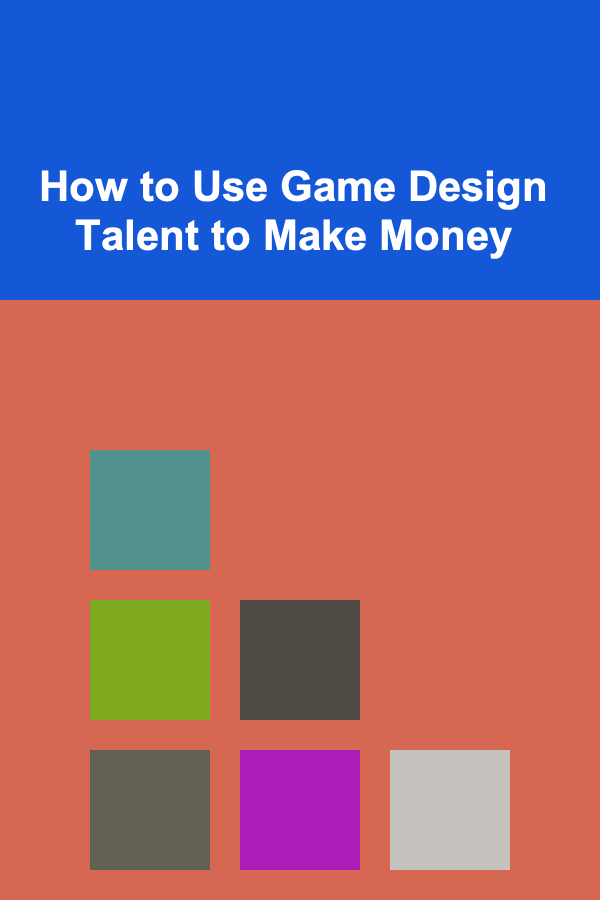
How to Use Game Design Talent to Make Money
ebook include PDF & Audio bundle (Micro Guide)
$12.99$10.99
Limited Time Offer! Order within the next:

Game design is an art form that has evolved from a niche hobby to a global industry worth billions of dollars. With the explosion of mobile games, indie developers, and the rise of gaming as a dominant form of entertainment, game design talent has never been in higher demand. But how can you, as someone with game design skills, leverage your talent to make money?
This article delves deep into the various ways in which you can monetize your game design talent, whether you're an experienced developer or just starting in the industry. From freelance opportunities to creating your own games, the gaming world offers countless paths to success.
Freelancing and Contract Work
Freelancing in the game design world has grown significantly in recent years. With the flexibility of remote work and the increasing demand for digital content, many game studios and companies are hiring freelancers to work on specific projects. As a game designer, you can offer your services for various tasks, from creating assets to designing game mechanics.
What You Can Do as a Freelance Game Designer
Freelance game designers are typically hired to work on certain aspects of a game, depending on their specialization. Here are some tasks that you could focus on as a freelancer:
- Game Mechanics Design: Designing the core gameplay mechanics that drive a game. This could involve creating a unique combat system, an exploration mechanic, or an innovative puzzle-solving feature.
- Level Design: Building levels and environments that fit within the game's narrative, ensuring that players are consistently engaged.
- Character Design: Creating characters, including their appearance, personalities, abilities, and how they fit into the game world.
- User Interface (UI) and User Experience (UX) Design: Designing the game's interface and ensuring that players have an intuitive and enjoyable experience.
- Art and Animation: If you have skills in digital art or animation, you can contribute to the visual side of the game, creating characters, environments, or in-game animations.
- Sound Design: Creating audio elements that contribute to the atmosphere and interactivity of the game.
Where to Find Freelance Opportunities
There are several platforms where freelance game designers can find work. Some popular websites include:
- Upwork: Offers a variety of game design jobs ranging from contract-based to project-based.
- Freelancer: A global platform for finding freelance jobs, including game development projects.
- Fiverr: A platform that allows you to offer your game design services at different price points.
- LinkedIn: A professional networking site where you can connect with potential clients or studios looking for game design talent.
By setting up a profile and actively engaging with potential clients, you can build a portfolio and establish yourself as a reliable game designer.
Indie Game Development
One of the most exciting ways to make money from game design talent is by creating your own games. The indie game industry has grown immensely over the past decade, with many successful games being developed by small teams or even solo developers.
Steps to Start Indie Game Development
Creating your own game may sound daunting, but with the right approach, it can be a rewarding endeavor. Here's a step-by-step guide to get you started:
A. Conceptualize Your Game
The first step in developing an indie game is coming up with a unique idea. Think about what kind of game you want to create. Do you want to build a narrative-driven experience, an action-packed shooter, or a relaxing puzzle game? Your idea should be something you're passionate about, as creating a game requires dedication and hard work.
B. Learn the Necessary Skills
While game design is a broad field, creating your own game often requires skills beyond design. Depending on the type of game you want to make, you'll need to learn:
- Game Engines: Tools like Unity and Unreal Engine are industry-standard for game development. These engines allow you to create both 2D and 3D games without needing to build a game engine from scratch.
- Programming: Learning programming languages like C# (for Unity) or C++ (for Unreal Engine) is crucial for implementing game mechanics and functionality.
- Art and Animation: If you're not an artist, you can either learn how to create basic 2D or 3D assets or hire freelance artists to help you.
- Sound Design: Learn the basics of sound editing or collaborate with a sound designer to create music, sound effects, and voice overs.
C. Develop and Test Your Game
Start by creating a prototype of your game. Don't worry about the graphics or perfection at first; focus on gameplay and mechanics. After you have a working version, test it with players to gather feedback and iterate on the design.
D. Market Your Game
Once your game is complete, marketing is essential. Platforms like Steam, itch.io, and GOG are popular for indie games, and creating an engaging website and social media presence will help you build a fan base. Engage with potential players early on by sharing development updates, teasers, and behind-the-scenes content.
E. Monetization Strategies
- Direct Sales : Selling your game on platforms like Steam, itch.io, or the App Store is the most straightforward way to make money. You'll keep a percentage of the revenue after the platform takes its cut.
- Crowdfunding: Platforms like Kickstarter and Indiegogo can help you raise funds to develop your game. In return, you offer backers rewards such as early access or exclusive in-game content.
- In-App Purchases and Microtransactions: If your game is free to play, you can generate revenue by offering in-app purchases for cosmetics, gameplay enhancements, or additional content.
Game Asset Creation and Selling
For game designers who prefer not to be involved in the full development process, creating and selling game assets can be a lucrative side business. Game assets are the visual, audio, and programming elements used in game development. These can range from character models, environments, and animations to sound effects and music tracks.
Types of Game Assets You Can Create
- 2D and 3D Models: Many indie developers and studios are looking for high-quality models to use in their games. This includes everything from characters and creatures to weapons and vehicles.
- Textures and Materials: Game designers need textures to give their models a realistic or artistic appearance. You can create and sell texture packs for environments, characters, or objects.
- Animations: Animated characters, objects, and environmental elements are essential for game design. If you have animation skills, you can create and sell animation packs for others to use.
- Sound Effects and Music: Sound designers are always in demand. You can create sound effects, background music, and voiceover recordings and sell them on marketplaces.
- Game Code and Scripts: If you're proficient in programming, you can write game scripts or code snippets (such as AI behaviors, physics engines, or user interfaces) and sell them to other developers.
Marketplaces for Selling Game Assets
Several online platforms make it easy to sell your game assets:
- Unity Asset Store: A marketplace for developers using the Unity game engine to purchase ready-made assets, such as models, sound effects, and scripts.
- Unreal Engine Marketplace: Similar to the Unity Asset Store, this is for creators using Unreal Engine to find assets for their games.
- itch.io: This platform allows you to sell both your games and game assets, making it a great option for indie developers.
- TurboSquid: A marketplace for 3D models that can be used in various projects, including games.
Creating game assets and selling them can provide a passive income stream while allowing you to work on your own projects or freelancing jobs simultaneously.
Game Design Education and Tutorials
If you have a deep understanding of game design and want to share your knowledge, creating educational content or tutorials is another way to make money. There is a growing demand for game design education, whether it's for beginners or more advanced learners.
How to Make Money Through Game Design Education
- Create Online Courses: Platforms like Udemy, Skillshare, and Teachable allow you to create and sell game design courses. Whether it's teaching the basics of game design or focusing on a specific skill like level design or character modeling, online courses are a great way to monetize your expertise.
- YouTube and Streaming: Create a YouTube channel or Twitch stream where you share game design tips, walk-throughs, and tutorials. You can monetize through ads, sponsorships, and viewer donations.
- Write Books or Articles: If you enjoy writing, consider writing books, eBooks, or articles on game design. These can be sold through Amazon or your own website, providing passive income over time.
Joining a Game Studio
If you're looking for more job stability, joining a game studio might be the right path. Large studios often have high-paying opportunities for game designers, offering the chance to work on big-budget games. While working for a studio can sometimes involve long hours and tight deadlines, it's a great way to gain industry experience and collaborate with a team.
Benefits of Working for a Game Studio
- Salary and Benefits: Full-time positions at game studios typically come with a stable salary, health benefits, and job security.
- Team Collaboration: Working with other designers, artists, programmers, and producers gives you the chance to learn and grow within the industry.
- Large-Scale Projects: If you want to work on AAA games, joining a big studio gives you the opportunity to contribute to high-profile projects with a global audience.
How to Get Hired by a Game Studio
- Build a Portfolio: Showcase your game design work, including projects you've worked on and games you've created. A strong portfolio is often more important than formal education in this industry.
- Networking: Attend game industry events, participate in online forums, and connect with other professionals in the field.
- Apply to Job Openings: Many game studios post job openings on their websites or on platforms like LinkedIn and Indeed. Make sure your resume and portfolio are up to date and tailored to the job you're applying for.
Conclusion
Monetizing your game design talent offers a wide array of opportunities, ranging from freelancing and indie game development to selling assets or teaching others. The gaming industry continues to expand, and with the rise of mobile gaming, virtual reality, and indie game development, there has never been a better time to turn your passion for game design into a sustainable income stream.
By leveraging your skills, building a portfolio, and staying informed about industry trends, you can find the right path to making money in the game design world. Whether you choose to create your own games, work for others, or teach the next generation of designers, the opportunities are endless.

Generating Passive Income by Licensing Deep Learning Models
Read More
How to Build a Checklist for Renovating Your Living Room
Read More
How to Ensure Safety Compliance in Rental Properties
Read More
How To Explore Epigenetics and Gene Regulation
Read More
How to Make Money Online as a Music Instructor: 10 Actionable Ideas
Read More
How to Sell Homemade Baked Goods and Start a Bakery Business from Home
Read MoreOther Products

Generating Passive Income by Licensing Deep Learning Models
Read More
How to Build a Checklist for Renovating Your Living Room
Read More
How to Ensure Safety Compliance in Rental Properties
Read More
How To Explore Epigenetics and Gene Regulation
Read More
How to Make Money Online as a Music Instructor: 10 Actionable Ideas
Read More